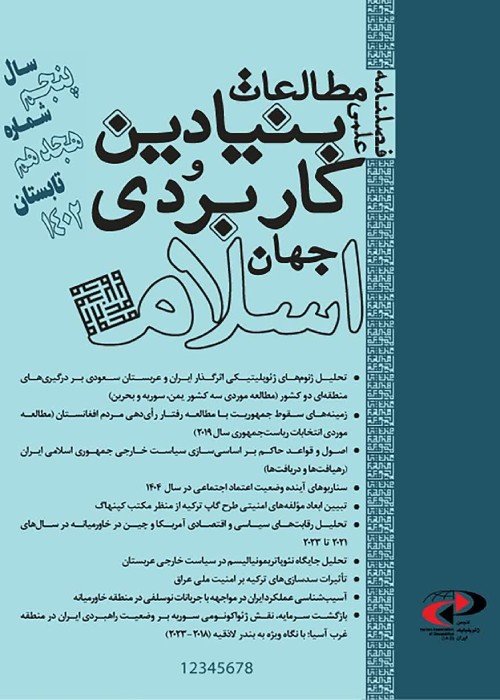Saudi Arabia’s turning towards Iraq (2003-2020); Transition from Identity Oriented confrontation to profit-oriented convergence
Saudi Arabia, After Saddam Hussain’s falling, has looked forward to Iraq security-political, economic and cultural trends by high sensitivity and so, has intervened in many of them. As a result of this intervention, Iraq lost its security and entirely destabilized and of course Saudi Kingdom lost the opportunity to build close ties with new political system in Iraq. Having this in mind forced the Iraqi side, including the nation and most Shia political blocks to distance Saudi as far as possible. As a result of this situation, Saudi political system put “Support Extremist groups", Isolation of Iraq and deepening sectarian gaps in Iraq's society into its policies towards the country. By 2015, after years of seeking “destabilizing policies”, Saudis couldn’t get desired achievements and Iraq could backlash by creating PMF and Shia blocks preserved their position in political system. To redress this weak position, Saudi kingdom changed its world view towards Iraq and established a new phase in its ties with Post-Saddam Iraq, which till then have become Post-ISIS too. In this framework, Riyadh changed its policies towards Iraq and rather seeking destabilizing attempts, started détente with Baghdad by focusing on cooperation in the economic sphere. At this period Saudis put aside long and historic “identical oriented” “suppressing Shia policy” and changed it to “benefit oriented” “economic cooperation policy”. According to the latter view, Riyadh from 2016 reengaged diplomatically with Baghdad and the Saudi ambassador arrived to Baghdad for the first time since 1991. After this important step Saudi high-ranking political figures such as Adel- Aljubair (then foreign Minister) came to Baghdad for the first time. Now 4 years after this rotation, all three Iraqi prime ministers (Abadi, Abdul-Mahdi; Kadimi) have been invited warmly to Riyadh, some 5 high commercial delegations have visited each other from both countries, Saudi has committed to support Iraq by more than 1 billion dollars in addition to gift a big stadium, Arar border entrance opened as the first border crossing point between the two, military cooperation has started, and the trend hasn’t been paused yet. This big change made the authors of the article use two theories (constructivism for the first phase and New-Functionalism for the second one). In this article, we have utilized Descriptive-explanative methodology for elaborating the turning point in Riyadh-Baghdad relations in post Saddam. We evaluate Saudi policy towards the issue of Iraq from 2003 to the Mid- 2020 and answer to this main question: “what changes have happened in Saudi Policy Towards Iraq in Post Saddam era”; To do so, we have explained that Riyadh, after 2016, by backfiring in its policies towards Iraq, which had rooted down in Anti-Shia attitude, changed its policy from a destabilizing one to a detente. In other words, Saudi Arabia after 2016, despite almost a decade of political and security conflict, has become an assistant actor for mostly Shia government in Baghdad and sought for a convergence. Through this article our assumption is “from 2003 to 2016, Saudis just considered new government in Iraq as a Shia actor which was based on identical attitudes, it was impossible to compromise with, but after that, with seeing no result from old attitudes, Riyadh chose to change the way and look at Iraq from functionalism point of view”. To verify mentioned assumption, we utilized descriptive-explanative method and constructivism and new functionalism as the methodology.
- حق عضویت دریافتی صرف حمایت از نشریات عضو و نگهداری، تکمیل و توسعه مگیران میشود.
- پرداخت حق اشتراک و دانلود مقالات اجازه بازنشر آن در سایر رسانههای چاپی و دیجیتال را به کاربر نمیدهد.



